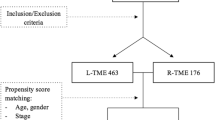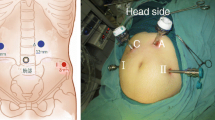Abstract
Aim
Robotic surgery allows for a better visualization and more precise dissection especially in the narrow male pelvis and mid and lower third of the rectum. However, superiority to laparoscopic TME has yet to be proven. We therefore analyzed short-term outcomes of laparoscopic and robotic low anterior rectal resection for rectal cancer.
Patients and methods
From 2011 to 2016, 44 robotic (RTME) and 41 laparoscopic (LTME) low anterior rectal resection with total mesorectal excision were performed at a single institution. Specimen quality was assessed and reported by an independent pathologist following international guidelines.
Results
The groups did not differ significantly regarding gender, age, ASA stage, BMI, and distance of the lower tumor margin from the anal verge. More patients in the RTME group underwent preoperative chemoradiation (43.2 vs. 19.5%, p = 0.019). The quality of the TME specimen was significantly better in the RTME group (complete/nearly complete/incomplete for RTME 97/0/3% and for LTME 78/17/5%, p = 0.03). The conversion rate tended to be lower in the RTME group (7 vs. 17%, p = 0.143). There was no difference in CRM positivity between the groups.
Conclusion
Robotic surgery is safe and can improve the quality of TME for rectal cancer compared to laparoscopy. Any effect on long-term survival remains to be established.

Similar content being viewed by others
References
Bhama AR, Obias V, Welch KB, Vandewarker JF, Cleary RK (2016) A comparison of laparoscopic and robotic colorectal surgery outcomes using the American College of Surgeons National Surgical Quality Improvement Program (ACS NSQIP) database. Surg Endosc 30(4):1576–1584
Bianchi PP, Ceriani C, Locatelli A, Spinoglio G, Zampino MG, Sonzogni A, Crosta C, Andreoni B (2010) Robotic versus laparoscopic total mesorectal excision for rectal cancer: a comparative analysis of oncological safety and short-term outcomes. Surg Endosc 24(11):2888–2894
Chi P, Chen Z (2017) Comparison of robotic and laparoscopic total mesorectal excision. Zhonghua Wei Chang Wai Ke Za Zhi 20(6):610–613
van der Pas MHGM et al (2013) Laparoscopic versus open surgery for rectal cancer (COLOR II): short-term outcomes of a randomised, phase 3 trial. Lancet Oncol 14(3):210–218
Lee SH, Lim S, Kim JH, Lee KY (2015) Robotic versus conventional laparoscopic surgery for rectal cancer: systematic review and meta-analysis. Ann Surg Treat Res 89(4):190–201
Sun Y, Xu H, Li Z, Han J, Song W, Wang J, Xu Z (2016) Robotic versus laparoscopic low anterior resection for rectal cancer: a meta-analysis. World J Surg Oncol 14:61
Ahmed J, Cao H, Panteleimonitis S, Khan J, Parvaiz A (2017) Robotic versus laparoscopic rectal surgery in high-risk patients. Color Dis 19:1092–1099
Dunn KB, Scarpinata R, Aly EH (2013) Does robotic rectal cancer surgery offer improved early postoperative outcomes? Dis Colon Rectum 56(2):253–262
Patriti A, Ceccarelli G, Bartoli A, Spaziani A, Biancafarina A, Casciola L (2009) Short- and medium-term outcome of robot-assisted and traditional laparoscopic rectal resection. JSLS 13(2):176–183
Odermatt M, Ahmed J, Panteleimonitis S, Khan J, Parvaiz A (2017) Prior experience in laparoscopic rectal surgery can minimise the learning curve for robotic rectal resections: a cumulative sum analysis. Surg Endosc 31:4067–4076
Balch GC (2009) Emerging role of laparoscopic and robotic surgery for rectal cancers. Ann Surg Oncol 16(6):1451–1453
Pox C, Aretz S, Bischoff SC, Graeven U, Hass M, Heußner P, Hohenberger W, Holstege A, Hübner J, Kolligs F, Kreis M, Lux P, Ockenga J, Porschen R, Post S, Rahner N, Reinacher-Schick A, Riemann JF, Sauer R, Sieg A, Scheppach W, Schmitt W, Schmoll HJ, Schulmann K, Tannapfel A, Schmiegel W, Leitlinienprogramm Onkologie der AWMF, Deutschen Krebsgesellschaft e. V, Deutschen Krebshilfe e. V (2013) S3-Leitlinie Kolorektales Karzinom Version 1.0 - Juni 2013 AWMF-Registernummer: 021/007OL. Zeitschrift fur Gastroenterologie 51(8):753–854
Schlachta CM, Mamazza J, Seshadri PA, Cadeddu M, Gregoire R, Poulin EC (2001) Defining a learning curve for laparoscopic colorectal resections. Dis Colon Rectum 44(2):217–222
Jeong SY, Park JW, Nam BH, Kim S, Kang SB, Lim SB, Choi HS, Kim DW, Chang HJ, Kim DY, Jung KH, Kim TY, Kang GH, Chie EK, Kim SY, Sohn DK, Kim DH, Kim JS, Lee HS, Kim JH, Oh JH (2014) Open versus laparoscopic surgery for mid-rectal or low-rectal cancer after neoadjuvant chemoradiotherapy (COREAN trial): survival outcomes of an open-label, non-inferiority, randomised controlled trial. Lancet Oncol 15(7):767–774
Xiong B, Ma L, Huang W, Zhao Q, Cheng Y, Liu J (2015) Robotic versus laparoscopic total mesorectal excision for rectal cancer: a meta-analysis of eight studies. J Gastrointest Surg 19(3):516–526
Allemann P, Duvoisin C, Di Mare L, Hübner M, Demartines N, Hahnloser D (2016) Robotic-assisted surgery improves the quality of total mesorectal excision for rectal cancer compared to laparoscopy: results of a case–controlled analysis. World J Surg 40(4):1010–1016
Huang YM, Huang YJ, Wei PL (2017) Outcomes of robotic versus laparoscopic surgery for mid and low rectal cancer after neoadjuvant chemoradiation therapy and the effect of learning curve. Medicine 96(40):e8171
Staderini F, Foppa C, Minuzzo A, Badii B, Qirici E, Trallori G, Mallardi B, Lami G, Macri G, Bonanomi A, Bagnoli S, Perigli G (2016) Robotic rectal surgery: state of the art. World J Gastrointest Oncol 8(11):757–771
de Jesus JP, Valadao M, de Castro Araujo RO, Cesar D, Linhares E, Iglesias AC (2016) The circumferential resection margins status: a comparison of robotic, laparoscopic and open total mesorectal excision for mid and low rectal cancer. Eur J Surg Oncol 42(6):808–812
Ahmed J, Cao H, Panteleimonitis S, Khan J, Parvaiz A (2017) Robotic vs laparoscopic rectal surgery in high-risk patients. Color Dis 19(12):1092–1099
Park SY, Choi G-S, Park JS, Kim HJ, Ryuk J-P, Yun S-H (2014) Urinary and erectile function in men after total mesorectal excision by laparoscopic or robot-assisted methods for the treatment of rectal cancer: a case-matched comparison. World J Surg 38(7):1834–1842
Kim JY, Kim NK, Lee KY, Hur H, Min BS, Kim JH (2012) A comparative study of voiding and sexual function after total mesorectal excision with autonomic nerve preservation for rectal cancer: laparoscopic versus robotic surgery. Ann Surg Oncol 19(8):2485–2493
Li X, Wang T, Yao L, Hu L, Jin P, Guo T, Yang K (2017) The safety and effectiveness of robot-assisted versus laparoscopic TME in patients with rectal cancer: a meta-analysis and systematic review. Medicine (Baltimore) 96(29):e7585
Hefermehl LJ, Largo RA, Hermanns T, Poyet C, Sulser T, Eberli D (2014) Lateral temperature spread of monopolar, bipolar and ultrasonic instruments for robot-assisted laparoscopic surgery. BJU Int 114(2):245–252
Sutton PA, Awad S, Perkins AC, Lobo DN (2010) Comparison of lateral thermal spread using monopolar and bipolar diathermy, the Harmonic Scalpel ™ and the Ligasure ™. Br J Surg 97(3):428–433
Nagtegaal ID, van de Velde CJ, van der Worp E, Kapiteijn E, Quirke P, van Krieken JH (2002) Macroscopic evaluation of rectal cancer resection specimen: clinical significance of the pathologist in quality control. J Clin Oncol 20(7):1729–1734
Krishna A, Russell M, Richardson GL, Rickard MJ, Keshava A (2013) Supervised surgical training and its effect on the short-term outcome in laparoscopic colorectal surgery. Color Dis 15(8):e483–e487
Author information
Authors and Affiliations
Corresponding author
Rights and permissions
About this article
Cite this article
Aselmann, H., Kersebaum, JN., Bernsmeier, A. et al. Robotic-assisted total mesorectal excision (TME) for rectal cancer results in a significantly higher quality of TME specimen compared to the laparoscopic approach—report of a single-center experience. Int J Colorectal Dis 33, 1575–1581 (2018). https://doi.org/10.1007/s00384-018-3111-x
Accepted:
Published:
Issue Date:
DOI: https://doi.org/10.1007/s00384-018-3111-x




